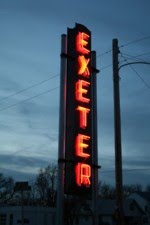Participants at Family Math at the Exeter-Milligan school
pairs parents and their children for a night of fun math activities. Didn't know those two works, math and fun, could co-exist in a sentence, did you?
Something parents never think
they will hear is, “Can we go back to school tonight for Family Math? Family
Math rocks!”
But parents in the
Exeter-Milligan school district hear that at least several times each year
since Exeter-Milligan faculty members Anita Mueller and Marla Weber started the
program.
This year they held four
sessions, two at the Exeter site and two at the Milligan site. Each
session was an hour long and “is a program to help parents and students become
more aware of the need for mathematics and the options it opens for young
people,” explained Weber. “It focuses entirely on parents and children learning
mathematics together.”
Each session was comprised of
selected activities for children ranging from kindergarten to sixth grade.
Strategies used to complete these activities varied by ability and age. Along
with the group games and activities, math centers were made available for those
wishing to explore other math activities.
During each session, problem
solving skills and hands-on activities were completed. Each evening, parents
and children were greeted by signing in on Venn diagrams and making
estimations.
“The program is designed to
build confidence by providing strategies for success in mathematics,” explained
Weber.
Topics included in the Family
Math classes fall into the general categories of arithmetic, geometry,
probability and statistics, measurement, estimation, calculators, computers,
logical thinking and careers. The Family Math program stresses the need for
providing opportunities for children to talk about mathematics with others, and
that it is equally important for parents to be able to talk with other adults
about mathematics.
Family Math was developed through the University of
California, Berkeley. Weber and Mueller attended a two-day training program in
1991 to learn how to set up a successful family math event.
**********Here is some advice from the
Family Math book by Jean Kerr
Stenmark, Virginia Thomsen and Ruth Cossey (Regents, University of California,
1986)******
1) Let your child know that you believe he/she can succeed.
2) Be ready to talk to your child about mathematics, and listen to what
he/she says. Ask your child to explain the meaning of each part of a problem.
3) Be more concerned with the processes of doing mathematics than getting a
correct answer. The answer to a particular problem has little importance, but
knowing how to find answers is a lifetime skill.
4) Try not to tell your child how to solve the problem. It’s better to ask
questions and help your child find his/her own methods of working it through.
5) Practice estimating with your child whenever possible. Estimation helps
them think about a problem that precedes the doing, and it helps kids
understand whether their answers make sense.
6) Provide a special place for study. Allow your child to help gear the place
to his/her learning style.
7) Encourage group study, especially as your children grow older.
8) Expect that homework will be done, and look at completed homework
regularly, but keep your comments positive. Praise your child for asking
questions.
9) Try not to drill your child on math content or create hostilities by
insisting that math work be done at one specific time or in a specific way.
10) Don’t expect that all homework will be easy for your child or be
disappointed that it seems difficult,
11) Let your child see you enjoying mathematics. Include recreational
mathematics in your family routine. Try to introduce math ideas (with a light
touch!) at the dinner table, while traveling, or while at the grocery store.
Cade Kresak and his dad, Brad Kresak, work through
some math problems at Family Math.
Aiden Vavra thinks about what his answer should be
before he tells his mom, Carrie Vavra, the right answer.
Andrew Vavra works through a problem with is dad, Alan Vavra
at Family Math.








